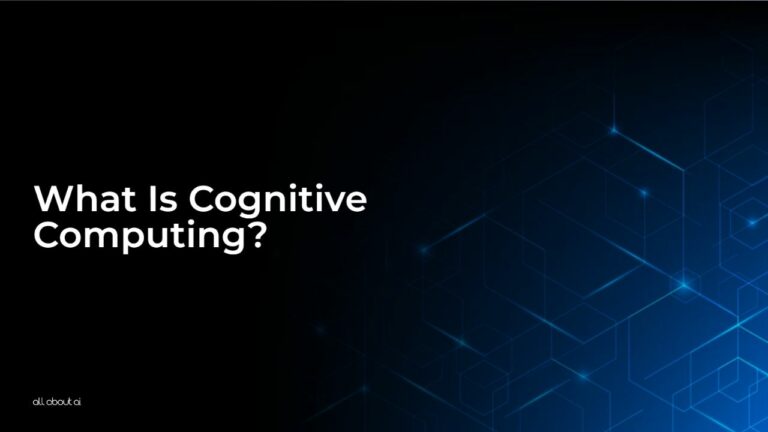Cognitive computing is a fascinating concept in the world of artificial intelligence (AI). What is cognitive computing? It refers to the development of computer systems that can simulate human thought processes, such as learning, reasoning, problem-solving, and decision-making. These systems are designed to understand and process vast amounts of data, making sense of unstructured information like text, images, and even human speech.
Looking to learn more about cognitive computing? Read this article written by the AI gurus at All About AI.
Examples of Cognitive Computing
Virtual Personal Assistants: One prominent example of cognitive computing in AI is virtual personal assistants like Siri, Alexa, and Google Assistant. These intelligent systems utilize natural language processing and machine learning algorithms to understand and respond to user commands, helping with tasks ranging from setting reminders to providing weather updates.
Healthcare Diagnosis: In the healthcare sector, cognitive computing is being employed to analyze patient data and assist doctors in making accurate diagnoses. IBM’s Watson, for instance, can sift through vast medical literature and patient records to suggest treatment options based on a patient’s symptoms and medical history.
Fraud Detection: Banks and financial institutions leverage cognitive computing to detect fraudulent transactions. These systems analyze transaction patterns and flag unusual behavior, helping prevent financial fraud.
Content Recommendations: Entertainment platforms like Netflix and Spotify utilize cognitive computing to recommend movies, TV shows, and music to users based on their viewing and listening habits. These recommendations become more accurate over time as the system learns from user interactions.
Autonomous Vehicles: Self-driving cars rely on cognitive computing to process sensor data and make real-time decisions to navigate safely on the road. These vehicles continuously analyze data from cameras, lidar, and radar to ensure passenger safety.
Use Cases of Cognitive Computing
Natural Language Processing (NLP): Cognitive computing is vital in NLP applications, enabling machines to understand and respond to human language. This is applied in chatbots, customer support, and language translation services.
Predictive Analytics: Businesses use cognitive computing to analyze historical data and predict future trends. This aids in inventory management, sales forecasting, and customer behavior analysis.
Cognitive Search: Search engines like Google employ cognitive computing to deliver more relevant search results by understanding the user’s intent and context.
Robotics: It enhances the capabilities of robots, allowing them to adapt to changing environments and perform complex tasks like sorting objects on a conveyor belt.
Virtual Reality (VR): In VR applications, cognitive computing enables more immersive experiences. It helps process user interactions and adjust the virtual environment accordingly.
Pros and Cons
Pros
- These systems can process and analyze vast amounts of data quickly, leading to more informed and data-driven decision-making across various domains.
- They excel at solving complex and ambiguous problems by considering multiple factors and variables simultaneously.
- Businesses can offer highly personalized experiences to their customers, tailoring products, services, and recommendations based on individual preferences and behaviors.
- Businesses can gain deeper insights into customer behavior, market trends, and operational efficiencies by harnessing this form of computing’s data analysis capabilities.
Cons
- Collecting and analyzing vast amounts of data raises privacy and security issues.
- Cognitive systems can perpetuate bias present in training data.
- Developing and maintaining cognitive computing systems can be expensive.
- Ensuring reliability and accuracy in AI systems remains a challenge.
- Automation driven by cognitive computing can lead to job displacement in some industries.
FAQs
How does cognitive computing differ from traditional computing?
It focuses on simulating human thought processes and understanding unstructured data, while traditional computing primarily deals with structured data and predefined algorithms.
Are there any ethical concerns with cognitive computing?
Ethical concerns include bias in AI algorithms, data privacy, and the potential for job displacement due to automation.
What industries benefit the most from cognitive computing?
Healthcare, finance, e-commerce, and customer service are among the industries that benefit significantly from this form of computing.
Is cognitive computing the same as artificial intelligence?
Cognitive computing is a subset of artificial intelligence, specifically focused on human-like cognitive abilities.
Key Takeaways
- Cognitive computing mimics human thought processes to make AI more intuitive and capable.
- Real-world applications include virtual assistants, healthcare diagnosis, and fraud detection.
- Pros include enhanced decision-making and improved customer experiences.
- Ethical concerns and job displacement are cons associated with cognitive computing.
- The future of AI lies in harnessing this computing power for a wide range of applications.
Conclusion
Cognitive computing is a groundbreaking leap in artificial intelligence. It equips machines with the ability to think, learn, and interact with humans in remarkably human-like ways. With its potential to revolutionize industries and empower innovation, it stands as a pivotal force shaping the future of technology and human-machine collaboration.
Embracing this transformative technology will undoubtedly lead to a world where AI systems play an increasingly integral role in our daily lives. This technology will make software more intuitive, efficient, and responsive than ever before.
After learning the answer to the question, “what is cognitive computing,” you’re probably hungry to learn more about the wide world of AI. To explore more AI-related topics, check out our comprehensive AI Compendium.





